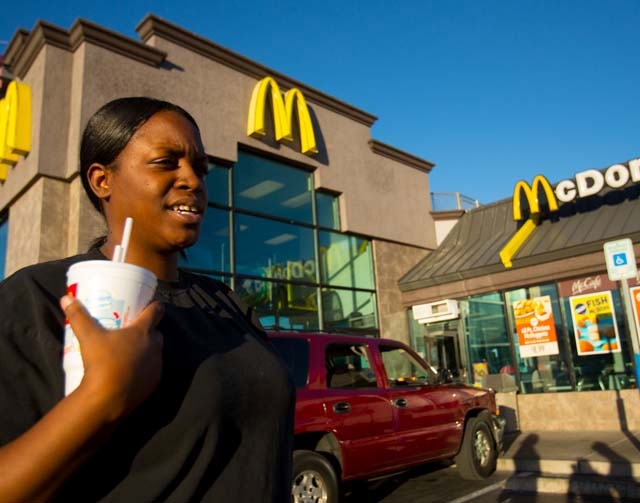Nevada lawmaker pursues ‘fat tax’ on fast-food items
Leavon Smith and his 6-year-old daughter walk out of a McDonald’s after finishing off a couple of burgers with fries Friday afternoon.
The 42-year-old Las Vegas resident says he had not heard about a bill that would tax calorie-rich fast foods in Nevada.
No, a 5-cent tax won’t stop him from going back to the restaurant, he says. It’s just too convenient.
But he doesn’t think the tax is a good idea at all.
“I don’t care for the idea much. We don’t eat much fast food,” he says, holding a large soda. “However, the tax is just going to hurt people who treat McDonald’s as a subsidized meal. We get taxed enough as it is.”
And so the Nevada discussion starts.
A “fat tax” introduced this week by a state lawmaker has drawn the Legislature into the national debate over the government’s role in tackling the obesity epidemic.
But the social engineering aspect of the proposal is drawing a mixed response in Nevada, where there has long been reluctance by many lawmakers to intrude on people’s personal habits.
Assemblyman Harvey Munford, D-Las Vegas, on Thursday introduced Assembly Bill 122, which would impose a 5-cent tax on fast-food items containing more than 500 calories.
Munford said he anticipates that the additional cost would cause parents to dine at fast-food establishments less frequently, helping fight the obesity epidemic, particularly among children.
Munford said he occasionally eats at such establishments himself, but he typically orders a fish or chicken sandwich, not a hamburger.
He said his proposal doesn’t mandate that parents seek healthier foods for their children but seeks to create a financial disincentive to pick unhealthy choices in fast-food restaurants.
A fast-food restaurant is defined as a place that sells food intended for immediate consumption which is served primarily in or on disposable wrappers, containers or plates.
If his bill gets a hearing, it will be reviewed by the Committee on Taxation. Munford said he would like any revenue raised from the tax to go to public education. He introduced a similar measure in 2011 but it did not get a hearing.
The measure faces an uphill battle. It would require a two-thirds vote in the Legislature to pass, and Gov. Brian Sandoval has made it clear he does not want to raises taxes this session.
AFTER-BURGER COMMENTS
Smith said the Legislature can only tax the public so much.
“I think it’s ridiculous. Sometimes a happy meal is cheaper than buying hamburger at the grocery store,” Smith said. “It’ll hurt the people who can’t afford to cook meals at home.”
However, not everyone feels as strongly as he does. Most people interviewed at the McDonald’s restaurant on Lake Mead and Martin Luther King boulevards Friday weren’t bothered by the tax proposal if the revenue goes to a good cause, such as education.
“I think the tax would benefit the community if the money went towards the kids. Education is more important than fast food,” said James Davis, 29, of Houston. “But, I don’t think the emphasis of taxes should be placed on people’s appetites. There are other ways to help obesity.”
But Smith doesn’t believe schools would see any increase in funding if the bill were passed.
“It’s a nice thought, but the money won’t go toward education, we all know that,” he said. “It’ll just go into a state piggy bank like everything else.”
While the bill’s goal is to lower childhood obesity, Chara Davis, who is not related to James Davis, said the tax isn’t likely to change people’s eating habits.
“It won’t affect people’s food decisions. They’re gonna eat what they wanna eat,” said the 32-year-old Las Vegas resident, who had an afternoon meal with her family at the restaurant. “We pay taxes anyway, so what’s five more cents? I bet people wouldn’t even notice the difference.”
FAT TAXES IN OTHER STATES
Similar “fat taxes” have been attempted in other states, many focusing on soda pop, but most have not been successful in the long term.
A California lawmaker in 2011 proposed a penny-an-ounce tax on soda pop and other sweetened drinks. The bill did not pass.
Washington state lawmakers imposed a tax on soda, bottled water and candy, but the measure was repealed by voters in 2010.
Most recently, New York Mayor Michael Bloomberg proposed a ban on the sale of large-size sugary sodas in the city because of concerns about obesity. The ban is set to take effect March 12 but faces a legal challenge from business groups.
And it is not just the United States where such measures have been considered. Danish lawmakers last year ended a “fat tax” after citing negative effects on the economy and small business.
Such social engineering efforts have seen mixed results in Nevada in recent decades. Lawmakers have rejected proposals such as requiring helmets for children while riding bicycles, and have consistently rejected efforts to make failing to wear a seat belt a primary offense, which would allow motorists to be pulled over for the infraction.
But it is illegal to ride a motorcycle without a helmet in Nevada, and lawmakers last year banned the use of cellphones while driving without a hands-free device.
OPINIONS ON GOVERNMENT’S ROLE
Assemblyman Joe Hogan, D-Las Vegas, the only co-sponsor of Munford’s bill, said government does have a role in fighting issues such as obesity.
“I think it’s the right thing to do just for the general benefit of the population and the public health,” he said.
Pamphlets and brochures to educate the public are either not read or frequently ignored, Hogan said.
“So I think it is good to have some modest level of ‘persuasion plus’ to give people real motivation to save themselves from this or that hazard,” he said.
Assembly Minority Leader Pat Hickey, R-Reno, a member of the Taxation Committee, said he will listen to the proposal but questioned whether government should be legislating on such an issue.
“I don’t think government should be picking winners and losers with respect to people’s diets,” he said.
Warren Hardy, a lobbyist for the Nevada Restaurant Association, said the organization believes that public education is the better way to fight obesity.
Healthy menu alternatives, which are offered at all types of restaurants in Nevada and nationally, are another positive response to such concerns, he said.
“Obviously this kind of thing comes from the right motivation,” Hardy said of Munford’s bill. “But this type of ‘sin tax’ has just been proven not to be effective. Nothing you eat is really evil unless you do it to excess.”
He also called it “the very definition” of a regressive tax.
BUSINESS OPPOSITION
Dean Heyl, director of state government relations for the International Franchise Association, said his group will oppose the measure. It would hurt both struggling families by increasing the cost of food and franchise operators who are surviving on razor-thin profit margins, he said.
Such proposals don’t seem to be getting much traction around the country, but the association will take the threat seriously and will oppose the bill by educating lawmakers, Heyl said.
The Center for Consumer Freedom issued a statement calling Munford’s proposal misguided.
J. Justin Wilson, senior research analyst for the organization, said: “Nevadans don’t need a Ph.D. in nutrition to tell them that eating or drinking too much of anything is unhealthy; it only takes a little common sense and personal responsibility.”
Childhood obesity is a real problem in Nevada.
The Nevada State Health Division issued a report in 2010 indicating that statewide, 38 percent of fourth, seventh and 10th grades are overweight, with more than half of this group defined as obese.
Contact Capital Bureau reporter Sean Whaley at swhaley@reviewjournal.com or 775-687-3900. Contact reporter Caitlyn Belcher at cbelcher@reviewjournal.com or 702-383-0264.



















